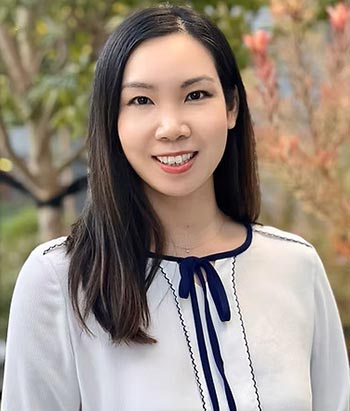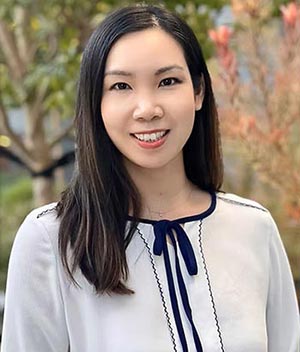Meet Dr. Elizabeth Choi, PH.D. at Banyan Behavioral Health in Burlingame, CA
Dr. Elizabeth Choi is a neuropsychologist with expertise in treating mood and behavioral symptoms related to neurological disorders such as stroke, traumatic brain injuries, and cancer. Dr. Choi also supports clients through challenges related to cultural transitions, trauma, and identity. Her therapeutic approaches include Cognitive Behavioral Therapy (CBT) and Dialectical Behavioral Therapy (DBT). For more information, contact us or request an appointment online. We are conveniently located at 877 Mahler Road, Suite 160, Burlingame, CA 94010. We serve patients from Burlingame CA, Foster City CA, South San Francisco CA, San Bruno CA, Belmont CA, Hillsborough CA, Millbrae CA, San Mateo CA and surrounding areas.


Dr. Elizabeth Choi, PH.D.
Director of Assessment Services
Licensed Clinical Psychologist (PSY33916)
Speaks Cantonese and Mandarin
(she/her/她)
Table of Contents:
Where did Dr. Elizabeth Choi receive her postdoctoral training in neuropsychology?
Where did Dr. Choi work as a registered psychologist before coming to the U.S.?
What therapeutic approaches does Dr. Choi use in her practice?
What additional services does Dr. Choi offer besides regular psychotherapy?
What is the focus of Dr. Choi’s current research?
Dr. Elizabeth Choi earned her PhD in Clinical Psychology with an area of emphasis in Neuropsychology from Palo Alto University. She received specialized postdoctoral training in neuropsychology at the University of California, San Francisco (UCSF)/ Zuckerberg San Francisco General and residency training in neurorehabilitation and complex medical health psychology at New York University (NYU) Rusk Rehabilitation.
Prior to coming to the U.S., Dr. Choi worked at the general hospital’s psychiatry and medical units as a registered psychologist in Hong Kong.
Dr. Choi has expertise in treating mood and behavioral symptoms arising from neurological disorders (stroke, traumatic brain injuries, concussion, and cancer). She also treats anxiety, depression, and trauma. Her sessions are a safe space to address immigration, race-based and intergenerational trauma, explore the triumphs and challenges of cultural transitions and adaptation, and facilitate the emergence of identities in a new country. Her approaches include Cognitive Behavioral Therapy (CBT) and Dialectical Behavioral Therapy (DBT).
Dr. Choi is a neuropsychologist, a specialist in the relationship between brain function, behaviors, and emotions. She provides evidence-based psychodiagnostic and psychological assessments at Banyan Behavioral Health. In addition to regular psychotherapy, Dr. Choi also offers 1) cognitive remediation (compensatory strategies for attention, memory, and executive functioning) when indicated by a neuropsychological evaluation from an outside provider; and 2) health psychology sessions where she helps clients with brain injuries enhance their coping and adjustment to cognitive and emotional changes and maximize strengths to improve their quality of life after brain injuries.
Dr. Choi’s doctoral research at the Stanford Brain Stimulation Lab examined depression, brain connectivity, and cardiac health. Her current research focuses on interventions targeting fatigue and cognitive changes in neurologically progressive disorders.
EDUCATION
∙ Doctor of Philosophy
(Clinical Psychology, Specialization: Neuropsychology)
Palo Alto University
∙ Master of Science (Clinical Psychology)
Palo Alto University
∙ Master of Social Science (Clinical Psychology)
Chinese University of Hong Kong
EXPERTISE
∙ Neuropsychological Assessment
∙ (ADHD, Autism, Traumatic Brain Injury, Psychodiagnostic Testing)
∙ Neurorehabilitation
∙ Health Psychology
∙ Anxiety
∙ Depression
∙ Trauma
PUBLICATIONS
∙ Cole, E. J., Stimpson, K., Gulser, M., Cherian, K., Tischler, C., Nejad, R., Bentzley, B., Pankow, H., Choi, E., Aaron, H., Espil, F., Pannu, J., Xiao, X., Duvio, D., Solvason, H., Hawkins, J., Guerra, A., Jo, B., Raj, K., Debattista, C., Keller, J., Schatzberg, A., Sudheimer, K., & Williams, N. R. (2020). Stanford Accelerated Intelligent Neuromodulation Therapy for Treatment-Resistant Depression (SAINT-TRD). The American Journal of Psychiatry, 177(8), 716-726
∙ Lau, E., Choi, E., Lai, E., Lau, K., Au, C., Ying, W.. Li, A.. (2015). Working memory impairment and its associated sleep-related respiratory parameters in children with obstructive sleep apnea. Sleep Medicine, 15, 1109-1115.
∙ Au, A., Ho, G., Choi, E., Leung, P., Waye, M., Kang, K., Au, K.. (2013). Does it help to train attention in dyslexic children: pilot case studies with a ten-session neurofeedback program. International Journal on Disability and Human Development, 13, 45-54.




